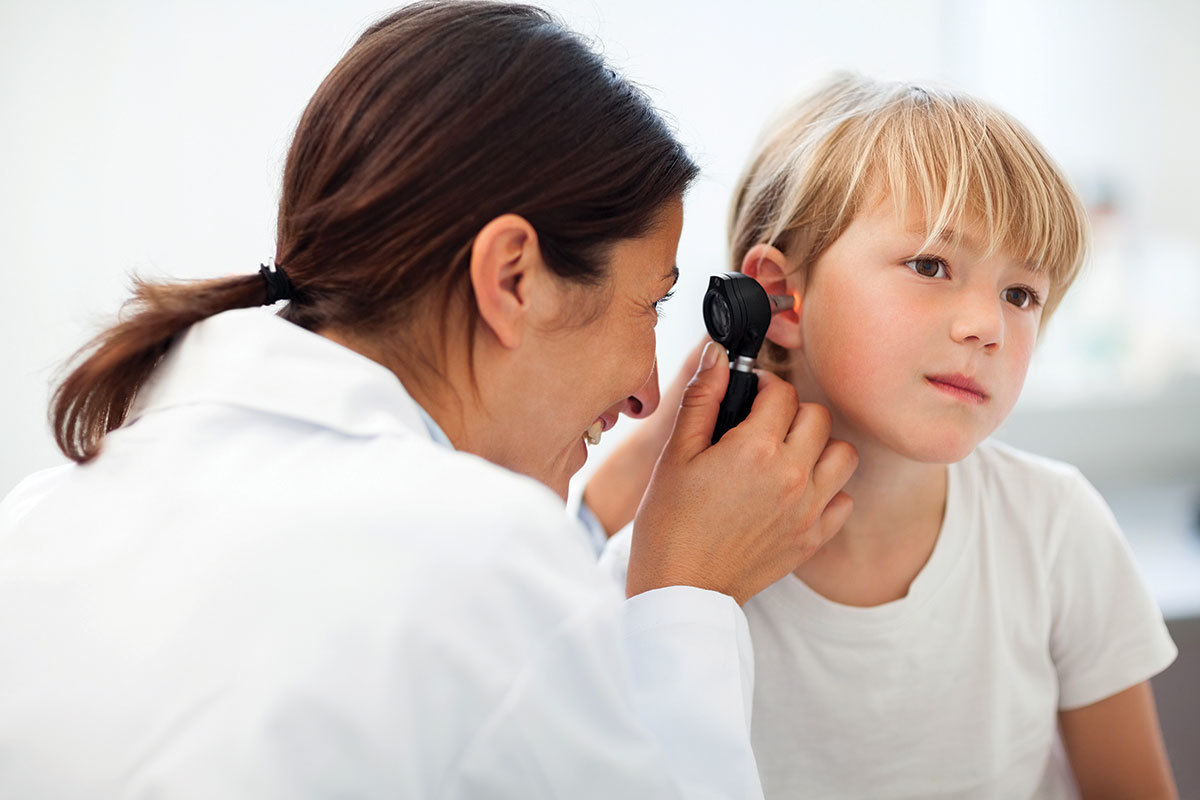Ears 101

Winter has arrived, and with it comes the increased chance that your little one will experience an ear issue during the colder months. But unless you’re a trained ear, nose, and throat doctor, you probably don’t have a great perspective of what’s going on. So how are you supposed to know when to be concerned or what to do when your kids are fussing about their ears? Should you clean them? Are they infected?
Mike Ferguson, MD, director, WakeMed Physician Practices – Ear, Nose & Throat (ENT) walks us through the ins and outs of the ear, proper care, and common problems.
To start, it’s important to know that all kids should be screened at birth for hearing while they’re at the hospital. If they don’t pass the screening, they’ll be referred to an ENT for help.
As they get older, a child could have problems with chronic fluid behind their ears, which could also affect speech development. Even if they passed a newborn screening, other problems can develop at age one to two. Sometimes it’s hard for parents to notice if a young child can’t hear very well.
If your child is unable to communicate what is bothering them, it might be tough to know what’s going on. Signs of problems with ears include crying, not nursing or taking a bottle, not sleeping, or a fever. Talk to your pediatrician if your child has any of these symptoms. If needed, they can refer you to an ENT for persistent problems such as recurring infections or other concerns.
Kids and Ear Tubes
As a parent, you might be wondering just exactly what ear tubes are and why some kids need them. “Some kids just have really short tubes so the middle ear doesn’t get ventilated or aerated properly,” says Dr. Ferguson. “This can cause fluid to collect behind the ear drum, which prevents proper vibration and can create hearing loss or an infection that builds up, causing a rupture of the ear drum.” Kids with repetitive infections need ear tubes to provide a temporary window into the middle ear to prevent the build up.
Injured Eardrum
All too often, the eardrum can be injured either by cleaning with a cotton swab or kids playing with sharp objects. Other possible injuries include a traumatic perforation. For example, a child might land really hard on water or another object in a specific way that causes pressure and ruptures the eardrum. Symptoms of an eardrum injury include immediate pain and possible hearing loss. While many eardrum injuries will heal without specific treatment, it can take several weeks to over a month. It’s important to see an ENT anytime you think there has been an injury.
Cleaning Ears
Many people believe that they should clean the inside of the ear with a cotton swab. Dr. Ferguson warns against this and says it causes more harm than good. He describes the ear as self-cleaning. Cleaning the outside of and behind the ear is fine, but avoid the temptation to clean inside it.
Parents can easily perforate a child’s eardrum when they think they’re harmlessly cleaning the ear. Even if you’re extra careful, a child can quickly move or jerk his or her head.
The ear canal isn’t a straight pipe – it is a curved tunnel. You can create other problems when you think you’re cleaning an ear. “People think they need to clean the wax out, but they are essentially pushing it in, which can cause other problems as the wax builds up and becomes harder,” says Dr. Ferguson. “Really, cleaning inside the ears is not required or recommended for children or adults.” Wax is secreted from the glands in the ear and creates a protective barrier for it. “It helps with water repelling, slows the ability of bacteria to grow, and can prevent chronic issues with itchy ears,” adds Dr. Ferguson.
The best rules for ear care are to never clean what you can’t see, and don’t put anything inside the ear. Wax will work itself out. If you can see it, you can simply brush it out with a soft cloth. If you can’t see it, leave it alone.
WakeMed Health & Hospitals
WakeMed’s ENT physicians offer a wide range of facial, ear, nose and throat services to children and adults including ear tubes, nasal and sinus care, allergy treatment, thyroid management, sleep apnea solutions, and more. Visit www.wakemedphysicians.com for more information.

